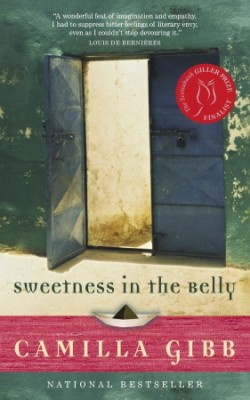Although the paperback was published in 2005, Sweetness in the Belly never made it to my reading list until last week. Camilla Gibb has written a brilliant book. I know you know. It was on all sorts of lists and everyone raved about it, which is probably why it took me so long to get around to it. But really, one word review: awesome.
Sweetness in the Belly is set in Harar, Ethiopia and London, England. The story is told through flashbacks to Ethiopia in the 70s and England in the 80s and 90s. Lilly is our protagonist and she is a white Muslim growing up in the class hierarchy system of an Ethiopian town where devout women pray, raise children and fight for survival against contaminated water, the jinn and other evil spirits, and husbands or lovers who leave them with children to raise and limited means to do so.
Lilly’s British, hippy parents raise her (sort of) as they travelled around African. But their unhappy end left Lilly in the care of a great Muslim teacher. On her journey to a shrine in Harar, many things happen that part her from her male travel companion and leave her in the care of Nouria, who’s less than thrilled to have another mouth to feed.
Lilly, the orphaned foreigner who knows the Qu’ran, learns the culture of Hararis and so does the reader along with her. Eventually caught up in the war, poverty and famine, Lilly escapes to live in London. It’s an exile, not a homecoming as she has left loved ones and must watch horrible events unfold from afar. But it’s actually through her exile that readers learn more of Ethiopia and of what it may be like for refugees.
On Islam:
Quote: This is what happens in the West. Muslims from Pakistan pray alongside Muslims from Nigeria and Ethiopia and Malaysia and Iran, and because the only thing they share in common is the holy book, that becomes the sole basis of the new community: not culture, not tradition, not place. The book is the only thing that offers consensus, so traditions are discarded as if they are filthy third-world clothes. ‘We were ignorant before,’ people say, as if it is only in the West that they have learned the true way of Islam.
In traveling through Indonesia, Turkey, Jordan and Egypt, I’ve experienced firsthand the moderation and cultural interpretations in a way that mean these sections of the text to really resonate with me. In Indonesia, I had a friend who when explaining praying said, “it is good to pray, it is better to pray with others, it is best to pray in the mosque.”
Everything was shades of grey that made perfect sense to me.
Later in the text, Lilly says “My religion is full of colour and possibility and choice; it’s a moderate interpretation … one that allows you to use whatever means allow you to feel closer to God, be it saints, prayer beads, or qat, one that allows you to have the occasional drink, work alongside men, go without a veil when you choose, sit alone with an unrelated man in a room, even hold his hand …”
It’s an interpretation where jihad is one’s personal struggle to be a good Muslim, not a fight against those who are not Muslim.
Sweetness in the Belly is one of those books that although set in a particular time and place, is really quite timeless.
Sweetness in the Belly by Camilla Gibb
Published by Random House of Canada
Canadian author
Available in paperback and ebook
